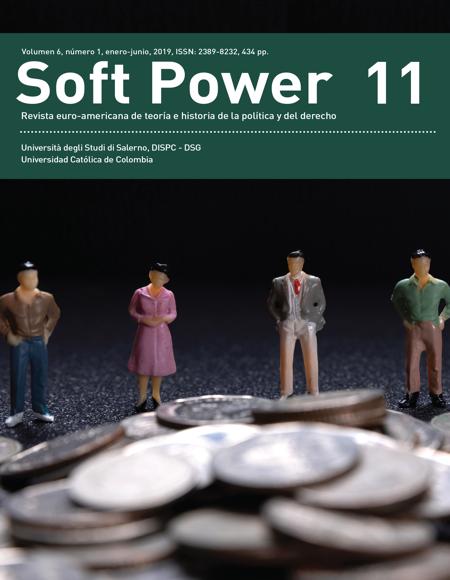Abstract
The complexity of the relations between contemporary legal systems implies a linking problem between the decision-making process and the recipients of the decisions, considering the growing uncertainty of acknowledging the convergence between the decision-makers and the recipients of those, that doesn’t find enough representation in the synthetic scheme of procedural democracy and in the free acceptance of power. The recipients of the decisions, coming from the institutions that de facto have the power to assume, related to the criteria of distribution of the rights and of the most essential ones, are not embodying the status of ‘citizenship’, or it is assumed in a very limited form. In the work, adopting the neo-contractual theory of J. Rawls and assuming as prioritary the problem of effectiveness, are examined all the aspects of the not perceived violation of the basic principle Quod omnes tangit ab omnibus approbari debet, in the framework of the close and ineluctable bond among the effectiveness of the law systems, the effective guarantee of the basic human rights, the concept of democratic citizenship and the the concept of democracy itself.
Keywords

References
Ackerman, B.A. (1980). Social Justice in the Liberal State. Yale: Yale University Press.
Alexander, S.S. (1974). Social Evaluation Trough Rational Choice. Quarterly Journal of Economics. (88), 597-624.
Appadurai, A. (1996). Modernity at large. Cultural Dimensions of Globalization. Minneapolis: University of Minnesota Press.
Badie, B. (1995). La fin des territoires: Essai sur le désordre international et sur l’utilité sociale du respect. Paris: Fayard
Barry, B. (1975). The Liberal Theory of Justice. A critical examination of the principal Doctrines. En J. Rawls, A Theory of Justice. Clarendon Press, Oxford.
Barry, B. (1989). Theories of Justice, University of California Press, Berkeley.
Bauman, Z. (1998) Globalization. The Human Consequences. Cambridge-Oxford: Polity Press.
Beck, U. (1997). Was ist Globalisierung? Irrtümer des Globalismus — Antworten au f Globalisierung. Frankfurt am Main: Suhrkamp Verlag
Bhagwati, J. (2004). In the Defens of Globalization. Oxford: Oxford University Press.
Boudon, R. (1988). L’acteur social est-il si irrationel et si conformist qu’on le dit?. En VV.AA., Individu et justice sociale. Autour de John Rawls. París: Seuil.
Catania, A. (2008). Metamorfosi del diritto. Decisione e norma nell’età globale. Roma: Laterza, Roma-Bari.
Comanducci, P. (1990). Il Neocontrattualismo nell’etica contemporánea. En VV.AA., Teorie etiche contemporanee. Torino: Bollati Boringhieri.
De Sousa Santos, B. (1995). Toward a New Common Sense. Law, Science and Politics in the Paradigmatic Transition. London: Routledge.
Ferrajoli, L. (1994). Dai diritti del cittadino ai diritti della persona. En D, Zolo (Ed.), La cittadinanza. Roma: Laterza.
Ferrajoli, L. (2001). Diritti fondamentali. Roma: Laterza.
Gauthier, D.P. (1967). Moral and Advantage. The Philosophical Review, 76(4), 460-475.
Giddens, A. (1999). Runaway World. How Globalization is Reshaping our Lives. London: Profile Books.
Gilpin, R. (1981). War and Change in World Politics. Cambridge: Cambridge University Press.
Habermas, J. Faktizität und Geltung. Beiträge zur Diskurstheorie des Rechts und des demokratischen Rechtsstaates Frankfurt a.M. 1992.
Habermas, J. (1999). Die postnationale Konstellation und die Zukunft der Demokratie oder Über die Möglichkeit eines demokratischen Prozesses in Europa, Hausarbeit.
Hardt, M., Negri A. (2000). Empire. Cambridge (MA): Harvard University Press.
Harsanyi, J.C. (1976). Essays on Ethics, Social Behavior and Scientific Explanation. Dordrecht: Reidel.
Höffe, O. (1988). L’Etat et la Justice, John Rawls e Robert Nozick. Paris: Vrin.
Höffe, O. (1988). Dans quelle mesure la théorie de John Rawls est-elle kantienne? En VV.AA. (1988), Individu et justice sociale. Autour de John Rawls. París: Editions de Seuil.
Höffe, O. (1988). L’Etat et la Justice, John Rawls e Robert Nozick. París: Vrin.
Höffe, O. (1994) Political Justice: Foundations for a Critical Philosophy of Law and the State. Oxford: Politi Press.
Iorio, V. (1995). Istituzioni pubbliche e consenso in John Rawls. Napoli: ESI
Kant, I. (1795). (2018) Zum ewigen Frieden. Köln: Anaconda Verlag
Lipset, S.M. (1959). Some social requisites of democracy. Economic development and political legitimacy, en American Political Science Review.
Nozick, R. (1974). Anarchy, State and Utopia. Oxford UK & Cambridge: Blackwell.
Rawls, J. (1967). A Theory of Justice. Cambridge: Cambridge University Press.
Rawls, J. (1999). The Law of Peoples with “The Idea of Public Reason Revisited”. Cambridge (MA): Harvard College.
Rawls, J. (2005). Political Liberalism. USA: Columbia University Press.
Singer, P. (2004). One World. The Ethics of Globalization. Yale: Yale University Press.
Stiglitz, J.E. (2006). Making Globalization Work. New York: W.W. Norton & Company.
Stiglitz, J.E.; Sen A., K.; Fitoussi J-P. (2010). Mismeasuring Our Lives: Why GDP Doesn’t Add Up, Paperback; Véase también SEN A. (2009), The Idea of Justice, Ltd.
Wallerstein, I. (1984). The Politics of the World-Economy. The States, the Movements, and the Civilizations. Cambridge (MA): Cambridge University Press.
Wallerstein, I. (2000). Capitalismo storico e civiltà capitalistica. Trieste: Asterios.
Walzer, M. (2004). Arguing about war. New Haven & London: Yale University Press.
Wolff, R.P. (1977). Understating Rawls. A Recostruction and Critique of A Theory of Justice. Princeton: Princeton University Press.













